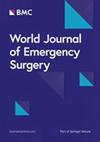Global perspectives in acute and emergency general surgery in low and middle-income countries: a WSES project protocol for scoping review on global surgery
IF 5.8
1区 医学
Q1 EMERGENCY MEDICINE
引用次数: 0
Abstract
Around five billion people globally lack access to safe, timely, and affordable surgical facilities and care in low-income and middle-income countries (LMICs). Global initiatives have been launched, including efforts led by organizations. Also, regional efforts have shed light on the unique challenges faced by different areas within LMICs. Despite these efforts, many countries still face significant challenges, including inadequate infrastructure, limited availability of trained surgical personnel, lack of essential medical equipment, and insufficient financial resources allocated to healthcare and their related possible factors. Here is that we aim to identify the progress made in areas such as capacity building, training programs, infrastructure development, and policy reforms, as well as highlight the gaps that persist, providing a foundation for future research. Such a comprehensive scoping review will be crucial to enhance surgical care services and ultimately improve health outcomes in LMICs. A comprehensive literature search up to November 2024 will be conducted across six major databases. PubMed, Scopus, Ovoid, Web of Science, Cochrane Central, CNKI (China National Knowledge Infrastructure) database. The methodology will follow the Preferred Reporting Items for Systematic Reviews and Meta-Analyses extension for Scoping Reviews (PRISMA-ScR) Checklist. The first version of this project will not include a quality appraisal.低收入和中等收入国家急症和急诊普通外科手术的全球视角:全球外科手术范围审查的WSES项目方案
在低收入和中等收入国家,全球约有50亿人无法获得安全、及时和负担得起的手术设施和护理。全球倡议已经启动,包括由各组织领导的努力。此外,区域努力揭示了中低收入国家不同地区面临的独特挑战。尽管作出了这些努力,但许多国家仍然面临重大挑战,包括基础设施不足、训练有素的外科人员有限、缺乏基本医疗设备、分配给保健及其相关可能因素的财政资源不足。我们的目标是确定在能力建设、培训计划、基础设施发展和政策改革等领域取得的进展,并强调仍然存在的差距,为未来的研究奠定基础。这种全面的范围审查对于加强外科护理服务并最终改善中低收入国家的健康结果至关重要。截止到2024年11月,将在6个主要数据库中进行全面的文献检索。PubMed、Scopus、Ovoid、Web of Science、Cochrane Central、CNKI数据库。方法将遵循系统评价和荟萃分析扩展范围评价(PRISMA-ScR)清单的首选报告项目。这个项目的第一个版本将不包括质量评估。
本文章由计算机程序翻译,如有差异,请以英文原文为准。
求助全文
约1分钟内获得全文
求助全文
来源期刊

World Journal of Emergency Surgery
EMERGENCY MEDICINE-SURGERY
CiteScore
14.50
自引率
5.00%
发文量
60
审稿时长
10 weeks
期刊介绍:
The World Journal of Emergency Surgery is an open access, peer-reviewed journal covering all facets of clinical and basic research in traumatic and non-traumatic emergency surgery and related fields. Topics include emergency surgery, acute care surgery, trauma surgery, intensive care, trauma management, and resuscitation, among others.
 求助内容:
求助内容: 应助结果提醒方式:
应助结果提醒方式:


